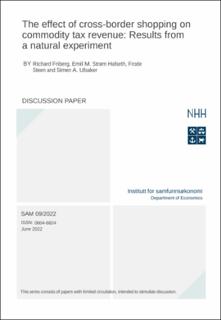| dc.contributor.author | Friberg, Richard | |
| dc.contributor.author | Halseth, Emil M. Strøm | |
| dc.contributor.author | Steen, Frode | |
| dc.contributor.author | Ulsaker, Simen A. | |
| dc.date.accessioned | 2022-06-21T10:30:03Z | |
| dc.date.available | 2022-06-21T10:30:03Z | |
| dc.date.issued | 2022-06-20 | |
| dc.identifier.issn | 0804-6824 | |
| dc.identifier.uri | https://hdl.handle.net/11250/2999784 | |
| dc.description.abstract | We use grocery data from Norway and COVID-19 border closings to gauge the effect of cross-border shopping on commodity tax revenue. Detailed store-category level data identify differential treatment effects that depend on distance to Swedish stores. Economically significant effects extend to up to two hours’ drive from the border, and even further for prominent cross-border shopping products as beer, cigarettes and soda. Across all products, cross-border shopping decreases tax revenue from VAT by 3.6% at the national level. National commodity tax revenue from carbonated soft drinks (subject to a sugar tax) is reduced by 8.1% and from cigarettes by 11.9%. | en_US |
| dc.language.iso | eng | en_US |
| dc.relation.ispartofseries | SAM DP;09/2022 | |
| dc.subject | Cross-border shopping, Commodity taxes, Excise taxes, Tax Competition | en_US |
| dc.title | The effect of cross-border shopping on commodity tax revenue: Results from a natural experiment | en_US |
| dc.type | Working paper | en_US |
| dc.source.pagenumber | 81 | en_US |
